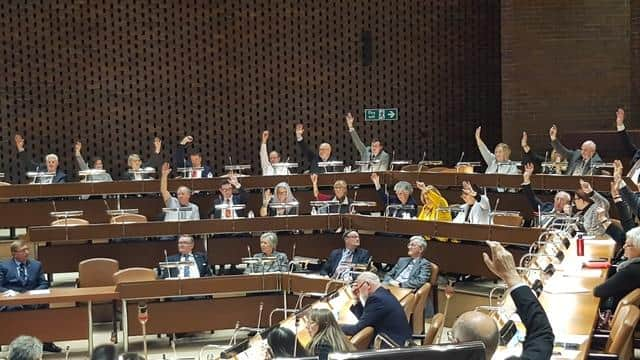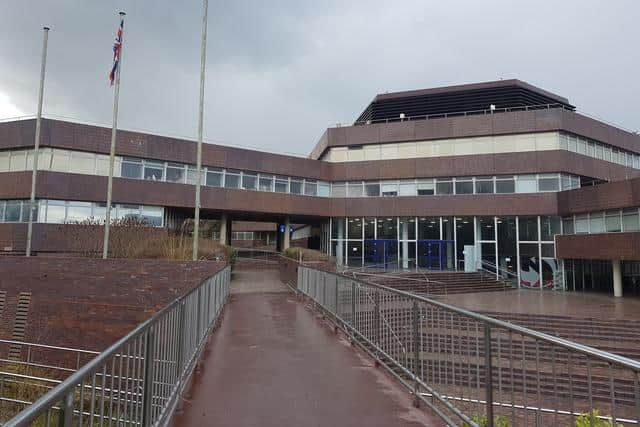Sunderland families facing Council Tax rise as councillors agree 3.99% increase
and live on Freeview channel 276
City leaders agreed the 2020/21 budget on Wednesday, March 4 which includes a 3.99% council tax increase in line with Government referendum guidelines.
The rise is made up of a 1.99% rise in core council tax and a 2% Government levy to deal with mounting adult social care costs.
Advertisement
Hide AdAdvertisement
Hide AdBand A properties, which make up nearly two thirds of all homes in Sunderland, will pay an extra 72p a week.


For council services, the benchmark Band D bill would increase annually by £56.41 to £1,470.09.
Figures will also be added for precepts – which the council collects on behalf of the Tyne and Wear Fire and Rescue Authority and Northumbria Police – and extra parish precepts for some city households.
The rise comes as council bosses look to save more than £3 million in 2020/21 with around £25 million in further cuts needed by 2023/24.
Advertisement
Hide AdAdvertisement
Hide AdLabour bosses said the authority has continued to protect key services despite “significant and disproportionate” Government grant reductions since 2010 – with savings of £315 million already made over the period.


Although Government funding for 2020/21 is the first real terms increase in a decade, the city council has seen its spending powers reduce by a third.
Council leader, Coun Graeme Miller, said the 2020/21 budget was shaped by the views of residents and would protect the vulnerable.
“This is a positive budget, reflecting the confidence and aspiration I’m sure we all have – or should have – for our city,” he said.
Advertisement
Hide AdAdvertisement
Hide AdRevenue spending plans include “enhanced city cleaning”, reducing the cost of household bulky waste collections, climate change schemes and tackling antisocial behaviour, among other proposals.
The council’s planned expenditure on services for 2020/2021 is around £669.2 million.
New investment spending of £270 million has also been agreed, taking the capital programme to more than £450 million over the next four years.
Council bosses have previously called for urgent changes to the way councils are funded by Government to ease local pressures, with council tax only raising around 16% of Sunderland’s overall budget.
Advertisement
Hide AdAdvertisement
Hide AdAt the meeting, Cabinet Secretary Coun Paul Stewart stressed Sunderland’s council tax rate would remain the “cheapest and lowest in Tyne and Wear.”
Council leader, Graeme Miller, added: “The harsh fact is if we don’t raise council tax we will need to cut services further and not invest in services our residents tell us they need.”
The key investments and projects in the spending plans
Dropping household bulky waste collection charge from £22.50 to £10 for six items;
£400,000 for city ‘deep cleans’ and £250,000 for public protection work;
Advertisement
Hide AdAdvertisement
Hide AdInvestment into the latest phase of the Sunderland Strategic Transport Corridor (SSTC3) that is bringing a dual carriageway into the city centre and opening up more regeneration opportunities;
£10 million to ensure that Sunderland is a digitally-enabled city with a world class fibre network; Funding for 500 new social housing properties and bringing empty homes back into use;
A £9 million 500-space car park on the Vaux site for future occupiers and general city centre use;
£15.070 million towards Riverside Sunderland Infrastructure to support developments on the Vaux site and surrounding areas;
Advertisement
Hide AdAdvertisement
Hide Ad£7.5 million Crowtree Square retail development on site of former Crowtree Leisure Centre;
New build primary schools at Sunningdale, Thorney Close and Hetton plus updates at Newbottle Primary and Barnes Junior School.;
£400,000 for improvements at Jacky Whites Market;
7.5 million for a replacement crematorium;
£1 million carbon reduction fund to help meet ‘climate emergency’ targets; A £140,000 cut to special responsibility allowances for councillors; Two new antisocial behaviour officers to allow targeted work in “hotspot areas.” £26 million investment in the culture and communities portfolio over the next four years, including planned investment in the infrastructure of Sunderland Museum and Winter Gardens; New children’s residential homes and increased funding for children’s social care; £10 million pounds additional funding for health and social care in 2020/21.
Amendment included cutting allowances for councillors
Amendments to the budget were also submitted by the Liberal Democrats and Conservatives.
Advertisement
Hide AdAdvertisement
Hide AdConservatives called for a one-off reduction in general reserves, reduction in trade union facility time, moving the Sunderland Airshow to a biennial event and reducing councillor allowances – in a bid to raise around £2 million.
Group leader, Coun Robert Oliver, said the amendment would provide a “tax break” for Sunderland residents and limit the council tax rise to the 1.99% levy for social care pressures.
Conservatives wanted to use funds for a range of proposals, including ten large litter bins in the city centre, 50 dog waste bins across Sunderland and a counselling trial for pupils at a secondary school.
The group also called for £20,000 to explore the feasibility of an independent investigation into the sewerage network at Seaburn.
Advertisement
Hide AdAdvertisement
Hide AdHowever, the council’s chief finance officer raised concerns about drawing funds from the reserves, saying it could put city council at financial risk.
A report, prepared for councillors, noted “risk exposure would be materially increased” if the amendment was approved.
Liberal Democrats aimed to raise just over £1.7 million in a range of proposals, including reducing budgets for area committees, a review and reduction of special responsibility allowances for councillors, reducing the council’s corporate communications budget by 25% and deleting Labour’s £1 million carbon reduction fund.
Other proposals included replacing the mayor and deputy mayor with an unpaid elected chairperson and deputy chairperson and reducing councillors’ expenses, food and drink provision and subsistence allowances.
Advertisement
Hide AdAdvertisement
Hide AdThe changes aimed to reduce the council tax rise to 2.99% and bring forward new proposals.
These included a means-tested ‘free’ pest control and bulky waste service, expanding the ‘free after 3pm’ city centre parking scheme to Monday-Friday, reversing the 2019/20 brown bin charge increase and boosting funding for disabled student travel support.
However, the amendments failed to win support in the chamber and were both defeated.
After hours of debate, the budget proposed by the ruling Labour group was passed with 41 votes in favour, 15 against and 2 abstentions.